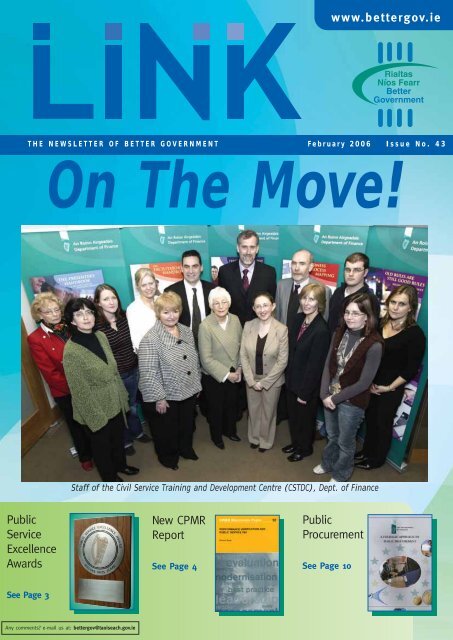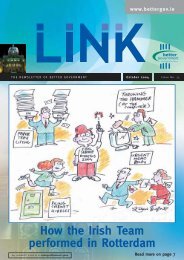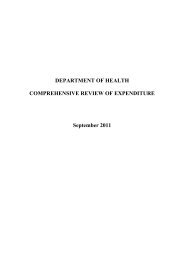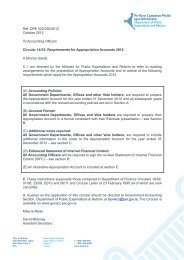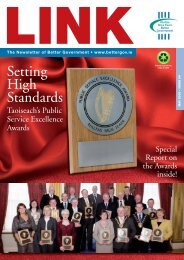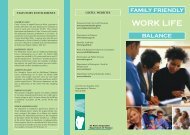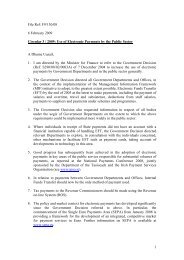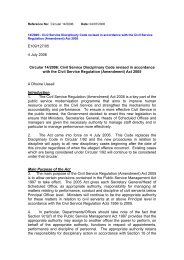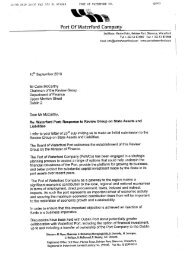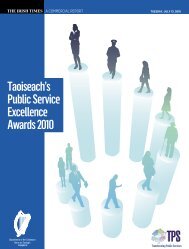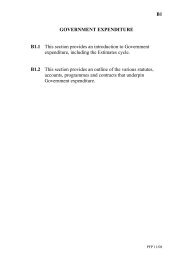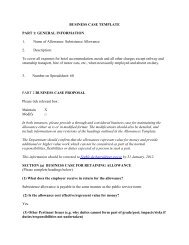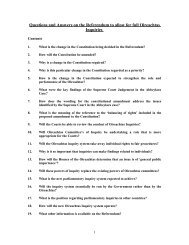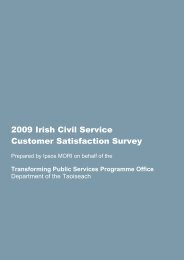Link Magazine Issue 43 â February 2006 - Department of Public ...
Link Magazine Issue 43 â February 2006 - Department of Public ...
Link Magazine Issue 43 â February 2006 - Department of Public ...
Create successful ePaper yourself
Turn your PDF publications into a flip-book with our unique Google optimized e-Paper software.
www.bettergov.ie<br />
THE NEWSLETTER OF BETTER GOVERNMENT<br />
<strong>February</strong> <strong>2006</strong> <strong>Issue</strong> No. <strong>43</strong><br />
On The Move!<br />
Staff <strong>of</strong> the Civil Service Training and Development Centre (CSTDC), Dept. <strong>of</strong> Finance<br />
<strong>Public</strong><br />
Service<br />
Excellence<br />
Awards<br />
New CPMR<br />
Report<br />
See Page 4<br />
<strong>Public</strong><br />
Procurement<br />
See Page 10<br />
See Page 3<br />
Any comments? e-mail us at: bettergov@taoiseach.gov.ie
Editorial<br />
Contents<br />
Editorial . . . . . . . . . . . . . . . . . . . . . . .2<br />
We Pay You . . . . . . . . . . . . . . . . . . . . .2<br />
<strong>Public</strong> Service Excellence Awards . . . . . .3<br />
New CPMR Report . . . . . . . . . . . . . . . .4<br />
New Benchmarking Body . . . . . . . . . . .5<br />
Q-Mark Achievement . . . . . . . . . . . . . .5<br />
Decentralising CSTDC . . . . . . . . . . . .6/7<br />
Equality Guidelines . . . . . . . . . . . . . . .8<br />
Competition . . . . . . . . . . . . . . . . . . . .9<br />
Improving Procurement . . . . . . . . . . . .10<br />
Business Regulation Forum . . . . . . . . .11<br />
RIA Training . . . . . . . . . . . . . . . . . . .12<br />
We Pay You!!!<br />
There are plenty <strong>of</strong> interesting articles in this, the first<br />
edition <strong>of</strong> LINK <strong>of</strong> <strong>2006</strong>.<br />
Many <strong>of</strong> you will have been eagerly awaiting news on the<br />
<strong>Public</strong> Service Excellence Awards (see across). I am very<br />
pleased to report that the Selection Committee has<br />
confirmed the award winners. Congratulations to all <strong>of</strong> the<br />
award winners and to everyone else who participated in the<br />
Taoiseach’s Awards to date. The Selection Committee had a<br />
very difficult task in selecting the award winning projects<br />
and your support and participation for the Awards is very<br />
much appreciated.<br />
The Civil Service Training and Development Centre<br />
(CSTDC) <strong>of</strong> the <strong>Department</strong> <strong>of</strong> Finance is in the process <strong>of</strong><br />
decentralising from Ballsbridge, Dublin to Tullamore, Co.<br />
Offaly. Read about the challenges and opportunities<br />
involved on pages 6-7.<br />
Other items that may be <strong>of</strong> interest include an update on a<br />
training course designed for Regulatory Impact Analysis,<br />
the establishment <strong>of</strong> the Business Regulation Forum and<br />
the publication by the Equality Authority <strong>of</strong> new Guidelines<br />
for Equal Status Polices in Enterprises.<br />
There is also an article on the report from the Committee<br />
for <strong>Public</strong> Management Research on Performance<br />
Verification and <strong>Public</strong> Service Pay. A short piece on the new<br />
Benchmarking Body, which is due to report in the second<br />
half <strong>of</strong> 2007, is on page 5.<br />
Congratulations are also due to the Child Benefit Section<br />
<strong>of</strong> the <strong>Department</strong> <strong>of</strong> Social and Family Affairs for being<br />
awarded the Q-Mark recently (see page 5 also).<br />
Did you know that you can earn €50<br />
for yourself by sending us an article<br />
for inclusion in LINK newsletter. If<br />
you have a contribution to make to<br />
LINK, send it to us. If we print it,<br />
we’ll send you €50, it’s that simple!<br />
So sharpen up your pencils and get<br />
scribbling. Articles can be forwarded<br />
to the Editor, LINK Newsletter,<br />
<strong>Department</strong> <strong>of</strong> the Taoiseach, Upper<br />
Merrion Street, Dublin 2 or by e-mail<br />
to bettergov@taoiseach.gov.ie<br />
The National <strong>Public</strong> Procurement Policy Unit (NPPPU) in<br />
the <strong>Department</strong> <strong>of</strong> Finance is responsible for developing<br />
policy in the area <strong>of</strong> public sector procurement. Find out<br />
about the latest developments in this important area on<br />
page 10.<br />
Why not enter our regular competition (page 9), for a<br />
chance to win a great prize.<br />
Thanks to our contributors for this edition and your<br />
suggestions for content are always welcome.<br />
Regards, Alan Plummer, Editor<br />
Lo Call: 1890 227 227, Direct: (01) 619 4483<br />
e-Mail: alan.plummer@taoiseach.gov.ie<br />
2
<strong>Public</strong> Service Excellence Awards <strong>2006</strong><br />
There has been a superb response to the <strong>Public</strong><br />
Service Excellence Awards and the independent<br />
selection committee, chaired by Ms. Marian<br />
Finucane, had a very difficult task in<br />
selecting the winning projects. After a<br />
selection process, involving 153 nominated<br />
projects, the committee decided that the<br />
projects below should be awarded a <strong>Public</strong><br />
Service Excellence Award.<br />
The award winners showcased their projects<br />
in the Imperial Hotel in Cork in <strong>February</strong><br />
and are now looking forward to<br />
participating in the <strong>Public</strong> Service Excellence<br />
Showcase and Awards Ceremony <strong>2006</strong> in Dublin<br />
Castle on Friday 31st March. The Dublin Castle<br />
Organisation<br />
Project<br />
Showcase is an opportunity for representatives from<br />
public service organisations to share their<br />
experiences <strong>of</strong> change, innovation and<br />
project management.<br />
Three <strong>of</strong> the award winning projects will go<br />
forward to represent Ireland at the 4th<br />
Quality Conference for <strong>Public</strong><br />
Administrations in the EU (4QC), which will<br />
be held in Finland in September <strong>2006</strong>.<br />
As places at the Showcase are limited, early<br />
reservation <strong>of</strong> your place is advised.<br />
Contact Jacqueline Dooner,<br />
Tel: (01) 619 4031 or by e-mail:<br />
jacqueline.dooner@taoiseach.gov.ie<br />
ComReg<br />
Cork City Council<br />
Crisis Pregnancy Agency<br />
Courts Service<br />
<strong>Department</strong> <strong>of</strong> Agriculture and Food<br />
Dublin City Council<br />
Galway City Council<br />
H.S.E. East Coast Area<br />
H.S.E. North East Area<br />
H.S.E. North East Area<br />
H.S.E. Western Area<br />
H.S.E. Western Area<br />
H.S.E Western Area (CROI)<br />
Irish Prison Service<br />
Irish Prison Service<br />
Local Government Management Services Board<br />
Louth County Council<br />
REACH Agency<br />
Sth. Infirmary Victoria Univ. Hosp., Cork<br />
Waterford County Council<br />
callcosts.ie website<br />
Park and Ride facility<br />
Positive Options Project<br />
Commercial Court<br />
Animal Health Computer System (AHCS)<br />
Putting the Customer First<br />
Ballybane Neighbourhood Village project<br />
Slán Abhaile Project<br />
Cavan/Monaghan Mental Health Services<br />
The Newgrange Process – care for the terminally ill<br />
Farmers Have Hearts - health screening programme<br />
‘Oro-motor’ speech groups for pre-school children<br />
The Cardiac Club - community cardiac health<br />
New Laundry System - Wheatfield Prison<br />
Achieving Excellence in Food Safety and Food Management<br />
Performance Management System for Local Authorities<br />
Animal Care Compound - innovative design, build and<br />
operation<br />
Death Event <strong>Public</strong>ation Service (DEPS)<br />
Pigmented Lesion Clinic - rapid access and diagnosis<br />
Best Practice Recycling<br />
3
Launch <strong>of</strong> Report on Performance<br />
Verification and <strong>Public</strong> Service Pay<br />
A seminar to launch a report by the Committee for<br />
<strong>Public</strong> Management Research (CPMR) entitled<br />
“Performance Verification and <strong>Public</strong> Service Pay”,<br />
was held in Farmleigh House, last December.<br />
The Report provides an assessment <strong>of</strong> the<br />
performance verification process under Sustaining<br />
Progress, which provided for the establishment <strong>of</strong><br />
Performance<br />
Verification Groups<br />
(PVGs) for the main<br />
sectors <strong>of</strong> the<br />
public service, i.e.<br />
the Civil Service,<br />
Health, Local<br />
Government,<br />
Education and<br />
Justice sectors.<br />
These groups are<br />
responsible for<br />
making<br />
recommendations<br />
as to whether the<br />
pay increases<br />
provided for under the agreement for public servants<br />
should be paid on the basis <strong>of</strong> whether there has<br />
been:<br />
stable Industrial relations,<br />
co-operation with flexibility and ongoing change,<br />
and<br />
satisfactory Implementation <strong>of</strong> the modernisation<br />
agenda.<br />
The study involved a comprehensive consultation<br />
process, which included interviews with the<br />
Chairpersons <strong>of</strong> the sectoral PVGs and most <strong>of</strong> the<br />
individual PVG members. Interviews also took place<br />
with the sectoral PVG secretariats and the Secretaries<br />
General from a number <strong>of</strong> Government <strong>Department</strong>s<br />
with key responsibilities in relation to performance<br />
verification. In addition questionnaires were sent to<br />
approximately 120 public service organisations to<br />
gain their views on the process.<br />
The attendance at the seminar included a large<br />
number <strong>of</strong> PVG members and <strong>Department</strong>al<br />
Secretaries General. Presentations were made by a<br />
number <strong>of</strong> speakers who provided valuable insights<br />
in relation to their unique perspectives on the PVG<br />
process, including:<br />
Donal de Buitleir, Allied Irish Bank and Chairman<br />
<strong>of</strong> the Civil Service PVG,<br />
Matt Merrigan, SIPTU and member <strong>of</strong> the Health<br />
and Local Government PVGs; and<br />
Joe Horan,<br />
South Dublin<br />
County Council and<br />
member <strong>of</strong> the<br />
Local Government<br />
PVG.<br />
The presentation by<br />
Richard Boyle <strong>of</strong><br />
the CPMR<br />
highlighted the key<br />
points to emerge<br />
from the report. He<br />
noted that the<br />
study found wide<br />
support for the<br />
broad structures and processes that have been put<br />
in place to manage the performance verification<br />
process. He also outlined some <strong>of</strong> the main<br />
recommendations and conclusions reached in the<br />
report. These included the following points:<br />
Eddie Sullivan, <strong>Department</strong> <strong>of</strong> Finance , Matt Merrigan, SIPTU, Joe Horan,<br />
South Dublin County Council, Sara White, <strong>Department</strong> <strong>of</strong> Communications,<br />
Marine and Natural Resources,Richard Boyle, IPA, Donal de Buitleir, AIB<br />
One <strong>of</strong> the most significant benefits <strong>of</strong><br />
performance verification has been the<br />
contribution it has made to industrial peace,<br />
A particular industrial relations benefit <strong>of</strong> the<br />
performance verification process is that it is seen<br />
as acting as an incentive to sort out problems<br />
“below the radar”,<br />
Performance verification has had an impact in<br />
terms <strong>of</strong> making things happen to a deadline,<br />
driven by the dates for the pay increases,<br />
Performance verification is making a useful<br />
contribution to flexibility, change and<br />
modernisation in the public service.<br />
Copies <strong>of</strong> the Report are available on<br />
www.cpmr.gov.ie<br />
4
New Benchmarking Body<br />
On 13th January, <strong>2006</strong>, a new <strong>Public</strong> Service<br />
Benchmarking Body, was established by Mr Brian<br />
Cowen T.D., Minister for Finance. The Benchmarking<br />
Body is due to report in the second half <strong>of</strong> 2007.<br />
The new Body will examine the pay and conditions<br />
<strong>of</strong> similar jobs in the public and private sectors and<br />
recommend whether the pay levels for the public<br />
service should be altered. Launching the new<br />
process, the Minister for Finance said that “it is<br />
important that public service pay is in line with the<br />
market – so that we can continue to attract high<br />
calibre people who can provide excellent health,<br />
education services etc.”<br />
This is the second time public service pay levels<br />
have been benchmarked against those in the<br />
private sector. The first Benchmarking Body<br />
reported in 2002. The recommendations <strong>of</strong> the first<br />
Benchmarking body were based on detailed research<br />
into pay and jobs in the public and private sectors.<br />
In order to examine jobs, the Body undertook<br />
detailed job evaluations. This involves measurement<br />
<strong>of</strong> the demands and responsibilities <strong>of</strong> each job<br />
The members <strong>of</strong> the Benchmarking Body are:<br />
being evaluated and a judgement as to the level <strong>of</strong><br />
compensation involved.<br />
Benchmarking is an alternative to the “relativities”<br />
approach to pay determination. The recent NESC<br />
report (People, Productivity and Purpose) noted<br />
that the benchmarking approach had yielded<br />
significant benefits including:<br />
Industrial peace - by contributing to industrial<br />
peace, benchmarking helped to create conditions<br />
in which critical issues <strong>of</strong> service quality could<br />
be addressed;<br />
replacement <strong>of</strong> relativities - benchmarking<br />
overcame the limitations <strong>of</strong> “leapfrogging” pay<br />
claims across sectors<br />
certainty - it replaced the system whereby pay<br />
awards were made over several years by different<br />
awarding bodies<br />
performance - 75% <strong>of</strong> the pay awards were made<br />
conditional on cooperation with change and<br />
modernisation.<br />
the <strong>Department</strong> <strong>of</strong> Agriculture and Food,<br />
<br />
<br />
Dan O’Keefe, S.C., Chairman,<br />
Billy Attley, former SIPTU General<br />
Secretary,<br />
<br />
Tom McKevitt, former Deputy Secretary<br />
General <strong>of</strong> the <strong>Public</strong> Service Executive<br />
Union,<br />
<br />
<br />
Olive Braiden <strong>of</strong> the Arts Council and<br />
former Chair <strong>of</strong> the Justice Sector<br />
Performance Verification Group,<br />
John Malone, former Secretary General <strong>of</strong><br />
<br />
<br />
Willie Slattery, Managing Director <strong>of</strong><br />
State Street International (Ireland) Ltd,<br />
Brendan Walsh, Emeritus Pr<strong>of</strong>essor <strong>of</strong><br />
Economics, UCD.<br />
Q-Mark Achievement<br />
Congratulations to the Child Benefit Section <strong>of</strong> the<br />
<strong>Department</strong> <strong>of</strong> Social and Family Affairs which was<br />
awarded the Q-Mark recently. The<br />
<strong>Department</strong>’s Quality Customer Service<br />
Unit supported the Section is attaining<br />
the award. Excellence Ireland Quality<br />
Association (EIQA) awarded the Q-Mark in<br />
recognition <strong>of</strong> the quality <strong>of</strong> the work <strong>of</strong><br />
the Section. Assessment involves an<br />
independent audit <strong>of</strong> a range <strong>of</strong> factors. The award<br />
is open to both private and public sector<br />
organisations and represents a fine<br />
achievement for the Child Benefit<br />
Section. You can read all about how the<br />
Child Benefit Section attained the award<br />
in the most recent edition <strong>of</strong> the<br />
<strong>Department</strong>’s magazine, Social Affairs.<br />
5
CSTDC Decentralising Chal<br />
Supporting the <strong>Public</strong> Service Modernisation<br />
Programme<br />
The Civil Service Training and Development Centre (CSTDC) is<br />
on the move to Tullamore in summer <strong>2006</strong> after more than 30<br />
years in Lansdowne House. Many readers will have, over the<br />
years, spent challenging days in Lansdowne House learning new<br />
skills to enhance their own and their organisations’ performance.<br />
There is little doubt that the pace <strong>of</strong> change in the Irish public<br />
service has accelerated considerably in recent years in response<br />
to increasing complex and demanding environments in which it<br />
operates.<br />
CSTDC supports the public service modernisation programme<br />
in developing core civil service skills and innovative training and<br />
development interventions. The move to Tullamore provides a<br />
set <strong>of</strong> challenges but also opportunities as CSTDC continues to<br />
support the public sector reform programme.<br />
CSTDC has the primary responsibility for training and<br />
development policy in the civil service and works closely with a<br />
series <strong>of</strong> high-level interdepartmental Networks and the crossdepartmental<br />
Training and Development Committee in<br />
supporting civil service modernisation. CSTDC will commence its<br />
operations in Tullamore from 1st September, <strong>2006</strong>.<br />
Vision<br />
In terms <strong>of</strong> moving to Tullamore, significant change also<br />
presents an opportunity to re-evaluate where CSTDC is going<br />
and how it is going to get there. The vision for CSTDC is to<br />
create an internationally recognised centre for management<br />
training and development and language training which will<br />
support the public sector reform process and the wider<br />
competitiveness agenda in the Irish economy.<br />
CSTDC has already commenced training in Tullamore in advance<br />
<strong>of</strong> its permanent move. A<br />
key objective will be to<br />
create and sustain a<br />
national presence in<br />
Tullamore as the first stage<br />
in establishing an<br />
internationally recognised<br />
management training and<br />
development and language<br />
training centre.<br />
The Primary Targets for<br />
CSTDC in the Transition<br />
Period are:<br />
1. Maintaining Business Continuity<br />
The overriding priority for CSTDC is to maintain business<br />
continuity in the transition period. This means that CSTDC must<br />
continue to deliver demand-driven training programmes for<br />
<strong>Department</strong>s including new training and development<br />
interventions. New products such as the Regulatory Impact<br />
Analysis programme and an Intercultural Awareness<br />
Programme have been designed in response to the demand to<br />
support the competitiveness agenda and to better understand<br />
the dynamic and evolving nature <strong>of</strong> Irish society in a globalised<br />
world.<br />
Maintaining business continuity also means ensuring transfer <strong>of</strong><br />
the wealth <strong>of</strong> skills, experience and corporate know-how from<br />
the existing cadre <strong>of</strong> trainers to the new team. This process is<br />
now well advanced with the majority <strong>of</strong> the new CSTDC team<br />
now in place. CSTDC is continuing to <strong>of</strong>fer training programmes<br />
during the transition to Tullamore.<br />
These include:<br />
In terms <strong>of</strong> senior management development, CSTDC is<br />
<strong>Public</strong> Procurement<br />
Legislative Process<br />
Regulatory Impact Analysis<br />
Policy Analysis<br />
Capital Appraisal Guidelines<br />
EU Meeting Skills<br />
Financial Management<br />
Intercultural Awareness<br />
Pre-retirement<br />
Freedom <strong>of</strong> Information<br />
The Line Manager<br />
responsible for the Secretaries General and the Assistant<br />
Secretary Conferences. Restoration <strong>of</strong> the Principal Officers’<br />
Conference has been identified as a priority measure for CSTDC.<br />
Proposals are being formulated for a suite <strong>of</strong> development<br />
interventions targeted at Principal Officer and Assistant Secretary<br />
level. The input <strong>of</strong> the cross-departmental Training and<br />
Development Committee will be sought on these proposals.<br />
CSTDC is also responsible for the sourcing, co-ordination,<br />
administrative support and evaluation <strong>of</strong> a range <strong>of</strong> innovative<br />
third-level programmes including at Masters level. In addition,<br />
CSTDC manages the Assistant Secretary, Personnel Officers’,<br />
<strong>Department</strong>al Training Officers’ and the PMDS Networks.<br />
2. Meeting the Demand for New Training<br />
Interventions<br />
The article on the new Regulatory Impact Analysis course (page<br />
8) illustrates how well CSTDC continues to meet demand for new<br />
6
lenges and Opportunities<br />
training interventions in the transition period. CSTDC will also<br />
shortly hold its first workshops on diversity and interculturalism.<br />
3. Supporting Civil Service Decentralisation<br />
CSTDC finds itself in the unique position <strong>of</strong> providing supports to<br />
decentralising <strong>Department</strong>s whilst at the same time<br />
decentralising itself. In terms <strong>of</strong> supporting decentralising<br />
<strong>Department</strong>s, CSTDC has approached this task at two levels.<br />
Firstly, CSTDC has produced a series <strong>of</strong> support manuals designed<br />
to provide practical advice and guidance to decentralising<br />
sections and divisions. These include Job Guide – Guidance for<br />
Managers, Business Process Mapping and Learning New Jobs –<br />
Guidelines for Jobholders, Managers and Training Staff.<br />
Secondly, CSTDC will continue to engage with decentralising<br />
<strong>Department</strong>s to identify and deliver training and development<br />
interventions to support the decentralisation process. Advice and<br />
guidance <strong>of</strong> the Training and Development Committee and the<br />
Personnel Officers’ Network will also be sought in relation to<br />
these interventions.<br />
Language Training Services<br />
CSTDC moving to Tullamore also presents new challenges and<br />
opportunities for the provision <strong>of</strong> language services. How<br />
language training is to be provided effectively, while being<br />
delivered from Tullamore, on a regional basis, is a key<br />
consideration. New imaginative and innovative business delivery<br />
methods may be necessary. The changing demographic and<br />
cultural mix in Ireland and Acht na dTeangacha Oifigiúla 2003<br />
are significant changes in the operating environment. CSTDC is<br />
looking forward to devising new solutions to language service<br />
delivery from Tullamore while maintaining the broad mix <strong>of</strong><br />
existing programmes and high standards <strong>of</strong> delivery.<br />
4. Repositioning CSTDC as primary provider <strong>of</strong> senior<br />
management training<br />
and development<br />
The restoration <strong>of</strong> the<br />
Principal Officers’ Conference<br />
and other initiatives under<br />
development at Principal<br />
Officer and Assistant<br />
Secretary level will<br />
commence the process <strong>of</strong><br />
enhancing CSTDC’s provision<br />
<strong>of</strong> quality development<br />
programmes for senior<br />
management. The views <strong>of</strong><br />
the Assistant Secretary and<br />
Personnel Officers’ Networks and the Training and Development<br />
Committee will form important inputs into the process.<br />
Stakeholder<br />
Engagement<br />
To deliver its vision, CSTDC<br />
will actively engage with<br />
stakeholders that have an<br />
interest in the business. The<br />
success <strong>of</strong> CSTDC’s business<br />
will depend on how well it<br />
meets the needs <strong>of</strong> its<br />
stakeholders. It will<br />
continue to adopt a<br />
proactive approach to<br />
development and delivery <strong>of</strong><br />
key training and<br />
development products in association with its stakeholders.<br />
The move to Tullamore presents new opportunities for CSTDC to<br />
engage with the local community, business interests and the<br />
third level sector as well as re-energising contacts with existing<br />
networks and the Training and Development Committee. The<br />
opportunity to engage constructively with the local community<br />
will be shared by many decentralising <strong>Department</strong>s. CSTDC has<br />
already engaged with the Athlone Institute <strong>of</strong> Technology in<br />
regard to identifying how the capabilities <strong>of</strong> that organisation<br />
can be made available to CSTDC in the furtherance <strong>of</strong> civil<br />
service modernisation.<br />
As <strong>Department</strong>s become embedded in local communities under<br />
the Decentralisation Programme they will have to compete with<br />
other employers for quality staff. Research clearly demonstrates<br />
that, in a competitive marketplace, employees will choose<br />
employers who have a commitment and a sense <strong>of</strong> corporate<br />
responsibility in how they engage with their staff, the local<br />
community, the environment, clients and suppliers. Training and<br />
development opportunities will be a key factor in attracting and<br />
retaining staff to decentralised <strong>of</strong>fices in particular.<br />
Going Forward<br />
CSTDC is determined to deliver quality training and development<br />
interventions to our clients to address current and future needs.<br />
We look forward to working with all stakeholders to support the<br />
public sector reform programme and to deliver the vision <strong>of</strong> an<br />
internationally recognised training and development function<br />
from our new Headquarters in Tullamore.<br />
For more information, see www.training.gov.ie<br />
7
New Equality Guidelines<br />
The Equality Authority recently published<br />
Guidelines for Equal Status Policies in<br />
Enterprises. This publication is part <strong>of</strong> a series<br />
aimed at promoting equality issues in<br />
organisations. Earlier publications include<br />
Guidelines for Employment Equality Policies in<br />
Enterprises and Guidelines for Equality and<br />
Diversity Training in Enterprises.<br />
The guidelines were produced by the National<br />
Framework Committee for Equal Opportunities<br />
which was established under Sustaining Progress to<br />
support equality in the workplace. The purpose <strong>of</strong><br />
the guidelines is to:<br />
Provide a rationale for the preparation <strong>of</strong> an<br />
equal status policy,<br />
Provide guidance on how to go about<br />
preparing such a policy,<br />
Establish the areas the policy needs to<br />
cover; and how these areas could be<br />
addressed,<br />
Identify materials and sources <strong>of</strong><br />
information and advice to assist in<br />
preparing an equal status policy.<br />
The publication is designed to address equality<br />
policies in relation to the provision <strong>of</strong> goods and<br />
services. It <strong>of</strong>fers a step by step approach in<br />
developing an equal<br />
status policy and<br />
contains very useful<br />
reference information<br />
on the Equal Status<br />
Acts.<br />
Organisations may<br />
wish to note that<br />
this series <strong>of</strong><br />
publications is<br />
supported by a<br />
funding scheme.<br />
Funding is<br />
available for<br />
organisations<br />
with less than 250<br />
employees to develop employment<br />
equality policies; to provide equality and diversity<br />
training; or, to develop equal status policies on the<br />
basis <strong>of</strong> guidance in these publications.<br />
Further information is available from The Equality<br />
Authority, www.equality.ie<br />
Pictured above are the first students who completed the Certificate in Civil Service and State Agencies<br />
Studies. This is a NUI accredited programme run by the Institute <strong>of</strong> <strong>Public</strong> Administration that considers the<br />
challenges, innovations and developments currently facing the civil service and state agencies, and provides<br />
a framework for understanding the wider process <strong>of</strong> governing in contemporary Ireland. The next Certificate<br />
commences in October <strong>2006</strong>. See www.ipa.ie for further details.<br />
8
Competition Time<br />
The prize for the first correct entry drawn is an i-Pod<br />
Nano, with two runners-up prizes <strong>of</strong> €100 and €50. So<br />
get your entries to us by Monday, 27th March <strong>2006</strong>. And<br />
remember, you can now enter the competition online at<br />
www.bettergov.ie<br />
1. What date was the Business Regulation Forum established on?<br />
2. How many projects will receive <strong>Public</strong> Service Excellence Awards?<br />
3. CSTDC is relocating to which town under the decentralisation<br />
programme?<br />
4. Which former international was recently appointed manager <strong>of</strong> the<br />
Irish senior soccer team?<br />
5. What month was the CPMR Report on the Performance Verification<br />
Process and <strong>Public</strong> Service Pay launched?<br />
6. Where will the <strong>2006</strong> <strong>Public</strong> Service Excellence Awards be presented?<br />
7. Who chairs the new Benchmarking Body?<br />
8. The All Island <strong>Public</strong> Procurement Conference and Exhibition takes<br />
place on what date?<br />
9. What famous GAA stadium plans to host international soccer and<br />
rugby fixtures in 2007?<br />
10. How many Irish projects will participate in 4QC the 4th Quality<br />
Conference for <strong>Public</strong> Administrations in the EU in Tampere, Finland?<br />
ANSWERS<br />
Send entries to LINK Competition, <strong>Public</strong> Service Modernisation Division, <strong>Department</strong> <strong>of</strong> the Taoiseach,<br />
Government Buildings, Dublin 2, giving us your name and contact details.<br />
NAME<br />
ADDRESS<br />
TELEPHONE<br />
E-MAIL<br />
<strong>Issue</strong> 42 Competition Results<br />
The winner <strong>of</strong> the Competition in <strong>Issue</strong> 42 is Bernadette Kingston, <strong>Department</strong> <strong>of</strong> Social and Family Affairs.<br />
Bernadette wins the first prize <strong>of</strong> an i-Pod Nano. Runners up prizes go to Nicola Broughall, Chief State<br />
Solicitor’s Office, who wins €100 and to Marie Kinsella, <strong>Department</strong> <strong>of</strong> Health and Children, who wins €50.<br />
Congratulations to all our winners.<br />
A total <strong>of</strong> 877 entries were received for the LINK 42 Competition.<br />
The answers are: 1. Red, 2. Sleigh, 3. Scotland, 4. 153, 5. Coca Cola, 6. Royal Hospital Kilmainham, 7. Boxing Day,<br />
8. Ebenezer Scrooge, 9. New York, 10. 27 October 2005.<br />
9
Improving Procurement<br />
Procurement can play an important role<br />
in achieving value for money in the<br />
delivery <strong>of</strong> public services. <strong>Public</strong><br />
sector procurement may be<br />
considered by public servants to be<br />
about compliance with EU procurement<br />
rules and tendering procedures. While compliance is<br />
important, seeking better outcomes from<br />
procurement effort is becoming a key component <strong>of</strong><br />
achieving value for money. The National <strong>Public</strong><br />
Procurement Policy Unit (NPPPU) in the<br />
<strong>Department</strong> <strong>of</strong> Finance is responsible for policy in<br />
this area.<br />
The key policy document is the National <strong>Public</strong><br />
Procurement Policy Framework, which supports<br />
the Unit’s programme <strong>of</strong> Procurement Management<br />
Reform. Based on international best practice, the<br />
Framework’s main goal is to support the<br />
development <strong>of</strong> a more strategic and analysis-based<br />
approach to procurement across the public service<br />
that will deliver savings and better outcomes. The<br />
Procurement Management Reform programme<br />
consists <strong>of</strong>:<br />
1 Capacity Building – to up-skill public<br />
servants in the use <strong>of</strong> new procurement<br />
planning techniques and put in place a<br />
network <strong>of</strong> expertise across the public<br />
service;<br />
2 Training and Education – to underpin the<br />
capacity building stream by developing a<br />
suite <strong>of</strong> courses, including 3rd Level, that<br />
will bring pr<strong>of</strong>essional accreditation to<br />
public procurement and support its longterm<br />
development;<br />
3 Aggregation – to explore opportunities to<br />
realise cost savings through joint public<br />
sector purchasing;<br />
4 E-procurement – to underpin the<br />
management reform programme with the<br />
introduction <strong>of</strong> cost effective procurement<br />
systems that will deliver additional<br />
efficiencies through using ICTs.<br />
The Framework also requires<br />
<strong>Department</strong>s and Agencies to<br />
develop Corporate Procurement<br />
Plans that contain targets to<br />
achieve savings and value for<br />
money objectives and identify the<br />
purchasing strategies to realise these. The<br />
development <strong>of</strong> these plans is supported by the<br />
NPPPU, which will continue to provide training for<br />
middle managers on expenditure and organisational<br />
analysis through <strong>2006</strong>. These are the key skills in<br />
the development <strong>of</strong> effective purchasing strategies<br />
which aim to ensure that goods and services are<br />
purchased at the right time, right price and for the<br />
right purpose.<br />
The NPPPU has launched a new s<strong>of</strong>tware evaluation<br />
tool, SUPREM (www.suprem.gov.ie), which has<br />
been designed to help public sector organisations<br />
develop their Corporate Procurement Plans.<br />
Organisations can use this tool by registering with<br />
the NPPPU.<br />
Enhancing Procurement<br />
Good procurement practices already exist in the<br />
public service. The aim <strong>of</strong> the NPPPU is to build on<br />
this good practice and bring a national focus to the<br />
benefits <strong>of</strong> smarter procurement.<br />
The Procurement Management Reform programme<br />
will not only affect procurement <strong>of</strong>ficers and public<br />
sector buyers; it will become a key part <strong>of</strong><br />
organisations’ business planning processes. In<br />
countries that have developed their approach to<br />
public procurement, it is at the centre <strong>of</strong> business<br />
planning alongside Finance, HR and IT to ensure<br />
that the organisation as a whole gets the most<br />
from its spending commitments. Raising the pr<strong>of</strong>ile<br />
<strong>of</strong> procurement to such a level in public sector<br />
organisations is a goal <strong>of</strong> the NPPPU and the<br />
National <strong>Public</strong> Procurement Policy Framework.<br />
As part <strong>of</strong> the drive to raise the pr<strong>of</strong>ile <strong>of</strong> public<br />
sector procurement, the NPPPU is jointly hosting<br />
an all island procurement conference with its<br />
Northern Ireland counterpart, the Central<br />
Procurement Directorate and, InterTradeIreland<br />
(across).<br />
For further information, visit www.procurement.ie<br />
10
Deepening Dialogue with Business<br />
The provision by the Civil Service <strong>of</strong> quality policies<br />
and legislation, is highly dependent on the depth<br />
and quality <strong>of</strong> the analysis, research and<br />
consultation that takes place in advance with other<br />
Government <strong>Department</strong>s, interested public bodies,<br />
state agencies and customer groups. Individually,<br />
many <strong>Department</strong>s have long-established systems in<br />
place to ensure that they can hold consultation<br />
meetings with their regular customer groups to<br />
discuss current issues <strong>of</strong> concern, or possible<br />
developments under consideration.<br />
The business community has well-established<br />
mechanisms for consulting with Government<br />
centrally in relation to pay or industrial relation<br />
matters, and with key <strong>Department</strong>s, such as<br />
Enterprise, Trade & Employment on specific matters<br />
<strong>of</strong> concern. However, it has become apparent that<br />
there is a need for greater and more focused<br />
dialogue with business to address their concerns<br />
regarding the amount <strong>of</strong> legislation and regulations<br />
that they must comply with.<br />
Following from an announcement by<br />
the Taoiseach in July last year, a<br />
Business Regulation Forum was<br />
established on 2 November last by<br />
the Minister for Enterprise, Trade &<br />
Employment, Mr. Micheál Martin T.D.<br />
This Forum comprises senior<br />
business and public sector members,<br />
and senior <strong>of</strong>ficials from the core<br />
<strong>Department</strong>s who have most<br />
dealings with the business<br />
community - Enterprise, Trade &<br />
Employment; Finance; Taoiseach;<br />
Transport; and Communications,<br />
Marine & Natural Resources.<br />
The Forum’s main role will be to<br />
examine and report to the Minister<br />
on particular difficulties that are<br />
being created for business as a<br />
result <strong>of</strong> outdated, inefficient, or<br />
disproportionate regulations or<br />
administrative requirements. The<br />
independent sectoral regulators,<br />
such as the Communications<br />
Regulator, the Telecommunications<br />
Regulator, and the Financial<br />
Regulator, will also meet with the<br />
Forum from time to time.<br />
The establishment <strong>of</strong> the Forum is<br />
one more step being taken as part<br />
<strong>of</strong> the Modernisation Agenda, to<br />
ensure that all new policy or<br />
legislative proposals are effective,<br />
focused, and efficient.<br />
11
Regulatory Impact Analysis Training<br />
In the last edition <strong>of</strong> <strong>Link</strong>, we reported on a pilot<br />
Training Course on Regulatory Impact<br />
Analysis (RIA) which took place in<br />
Farmleigh House in October. We are<br />
happy to announce that an updated<br />
version <strong>of</strong> that course is now being<br />
run regularly as part <strong>of</strong> the Training<br />
Programme run by the Civil Service<br />
Training and Development Centre<br />
(CSTDC), <strong>Department</strong> <strong>of</strong> Finance. This<br />
Course (organised in conjunction<br />
with the Better Regulation Unit)<br />
was held in January and will take<br />
place again in <strong>February</strong>, March and<br />
May.<br />
Expert Presenters<br />
The Course is held over two consecutive days and<br />
begins by setting RIA in a broader regulatory<br />
context. It includes presentations by distinguished<br />
external speakers such as Pr<strong>of</strong>essor Frances Ruane<br />
(TCD), John Sweeney (NESC) and Etain Doyle<br />
(formerly Telecommunications Regulator and now a<br />
Regulatory Consultant). They outline the<br />
background and purpose <strong>of</strong> economic and social<br />
regulation as well as the rationale behind the<br />
creation <strong>of</strong> independent sectoral regulators.<br />
Course Modules<br />
A number <strong>of</strong> detailed modules then cover the<br />
application <strong>of</strong> RIA, running through<br />
the various steps involved in the Irish<br />
RIA model. This includes a session on<br />
analytical techniques and another on<br />
the application <strong>of</strong> RIA to EU<br />
regulations. The second day concludes<br />
with a RIA Workshop where participants<br />
get the chance to test their newly-honed<br />
RIA skills by applying RIA to a specific<br />
case.<br />
Who Should Attend?<br />
The Course is <strong>of</strong> relevance to <strong>of</strong>ficials<br />
involved in regulation at national or EU<br />
level. It should be <strong>of</strong> particular interest to<br />
those currently involved in developing the General<br />
Scheme <strong>of</strong> a Bill to which RIA must be applied.<br />
There is already significant interest in the upcoming<br />
courses so anyone interested in attending should<br />
contact:<br />
Róisín Wiseman, roisin.wiseman@finance.gov.ie or<br />
Vivienne Graham, vivienne.graham@finance.gov.ie<br />
in CSTDC as soon as possible.<br />
Vivienne Graham, CSTDC, Róisín Wiseman, CSTDC and Mary-Clare O’Sullivan, Better Regulation Unit, Dept. <strong>of</strong> the Taoiseach<br />
12<br />
Published by <strong>Public</strong> Service Modernisation Division, <strong>Department</strong> <strong>of</strong> the Taoiseach, Government Buildings, Upper Merrion Street, Dublin 2. <br />
Phone: (01) 619 4483 Fax: (01) 619 4239 E-mail: bettergov@taoiseach.gov.ie LINK and other SMI/PSM publications are available on<br />
our website: www.bettergov.ie and at www.irlgov.ie/taoiseach Design and Artwork by Boyd Freeman Design © Copyright Government <strong>of</strong><br />
Ireland Tá leagan Gaeilge (NASC) den iris seo ar fáil freisin A Braille copy <strong>of</strong> LINK is available on request.


